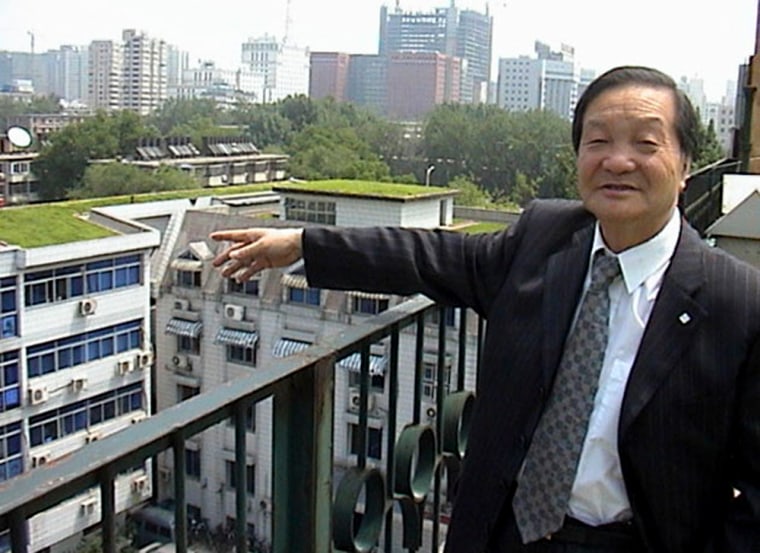Something in the sky has always fascinated Wang Xianmin.
An aeronautics graduate, he spent more than 20 years engaged in airplane manufacturing and research. Now, at age 60, he looks to the sky once again for a way to battle Beijing's pollution and stage a "Green Olympics" in 2008.
As the giant clock counter at Tiananmen Square shows 1176 days before the 29th Olympiad, Beijing is in the midst of what some say is the most massive engineering project since the Great Wall, bulldozing ancient housing areas, constructing sports venues, modernizing transport infrastructures and accelerating major building projects in time for the world's most prestigious sporting event, which Beijing also hopes will showcase China's coming of age as a major world power.
But the success of the $38 billion Olympic project — and the country's sense of pride — may still hang in the balance, not least because of the colossal challenge of cleaning up Beijing's environment. The remedy, at least for the 19-person outfit led by Wang, is a "green revolution in the sky."
"Whenever I looked down at Beijing from the sky, I felt the city's rooftops were very ugly," Wang lamented.
As secretary-general of China Environment Protection Foundation, he has set about an unprecedented project to transform the city's bleak and barren rooftops into fields of grass and trees, with the country's overriding Olympic dreams as the driving force.
"Come 2008, we will present the world with a pleasant surprise," Wang said. His office is plastered with large futuristic photos showing sky gardens around the Tiananmen Square and Forbidden City, including grass fields on top of the skyscrapers in Beijing's premiere business districts.
A multi-pronged strategy
The "green rooftop" project is a major component of Beijing's multi-pronged strategy to meet mandated air-quality standards in time for the Summer Olympics of 2008. "It is the least expensive, actually," Wang contended.
Beijing is spending billions of dollars to relocate some 200 polluting factories, and to lay down the pipelines and infrastructure for substituting natural gas for coal, which is a principal source of air-borne particles.
Higher emission standards are also being adopted to control the poisonous fumes from Beijing's millions of cars. A billion-dollar forest belt, stretching some 6,000 miles north of the Great Wall, is being built to restrain desert movement and dust storms.
"The relocation of just one factory, the Capitol Steel Plant, has cost half a billion dollars," Wang said, referring to the mammoth coal-burning complex on the western edge of the city. "With the same amount, we can reach our goal of 40 million square meters of rooftop gardens and increase Beijing's green acreage by about 50 percent," he added.
‘It’s a gigantic task’
With an initial 10,000 square meters of rooftop lawns created last year, Wang said the target this year is to expand acreage by about 200,000 square meters, half to be funded by the government and the rest by various financial sources. The accelerating program envisions some 60 percent of low-rise buildings and about 30 to 40 percent of high-rises topped with green grass fields by 2008.
"It's a gigantic task," Wang admitted. "But if everybody acts and the task is subdivided among various districts and work units, then the task at hand becomes small," he explained.
As chief coordinator of the "green rooftop" project, Wang's association has already entered into partnership with some 30 enterprises, involving tens of thousands of workers and farmers.
Wang began his research soon after Beijing won the Olympic bid in 2001. Pilot projects have shown that two types of sturdy grass — the linear-stone crops from China's northwest deserts, and the evergreen grass, also called sedum, with thick, fleshy leaves, grown in China and Germany — are most suitable because they need little watering, soil and care.
Wang said a square meter of sky lawn could cost as little as $3, with annual maintenance at just a dollar.
He conceded, however, that government funding and donations will not be enough to realize his dream, and that "legal compulsion" may be necessary to tap the vast resources of the corporate world.
"Real estate developers destroy the earth on the ground, and it's reasonable to demand that they compensate nature by creating rooftop gardens," he asserted.
His association is lobbying for a new building code that will require that between one and three percent of the overall construction budget is allocated for customized rooftop gardens, which could only cost about $40 per square meter.
"Why, if Mercedes Benz or Ford make new buildings in their home country, they are required to create rooftop lawns, but they are under no compulsion to do so in China?" he lamented.
Celebrity backing
Wang said he had no doubt about the popular appeal of the program, which should translate into future massive support and donations.
As proof, he cited the recent greening of the rooftop of Beijing Hotel, a city landmark, which was attended by nine famous film stars who are look-alikes of China's past revolutionary leaders like Deng Xiaoping and Mao Zedong.
"We have to do our share for a better environment," remarked Lu Qi, who acts as Deng in movies, while laying a grass bed at the event.
"Movie stars like them charge $12,000 per public appearance but to show their support, they waived their fee," Wang pointed out.
"Summer temperature at rooftops could soar as high as 72 degrees centigrade (187 degrees Fahrenheit); people tend to consume more water and electricity under that," he said.
"The rooftop gardens will beautify Beijing for the Olympics, reduce air pollution and cut down energy consumption," Wang said.
